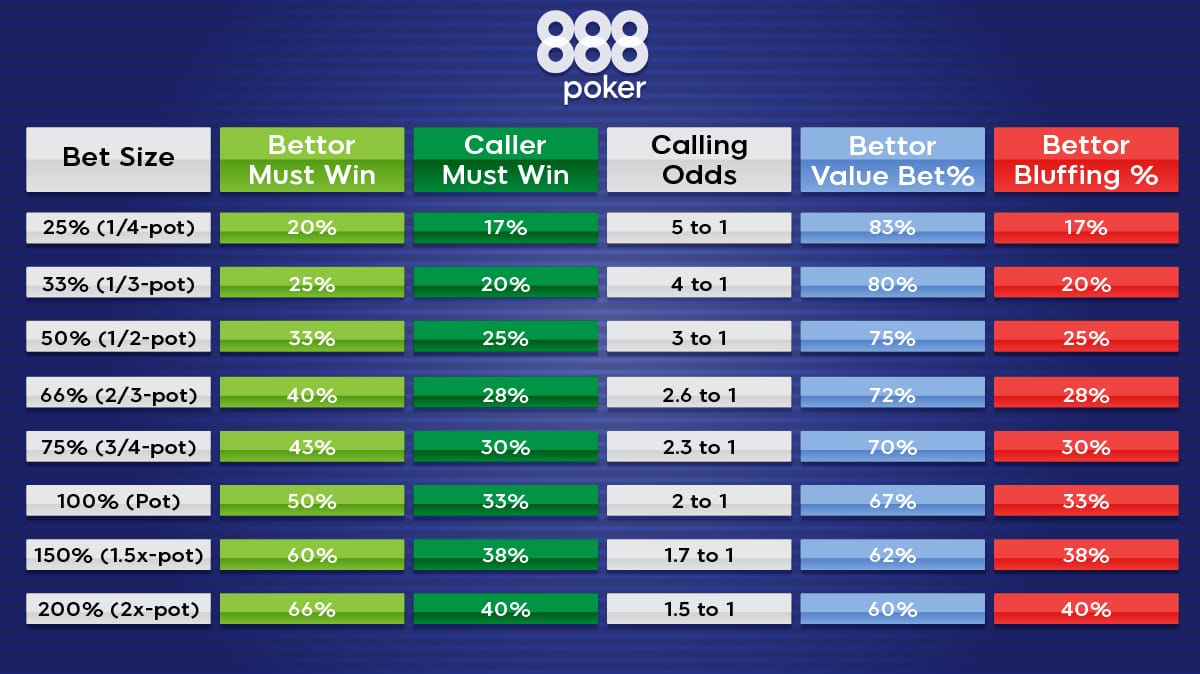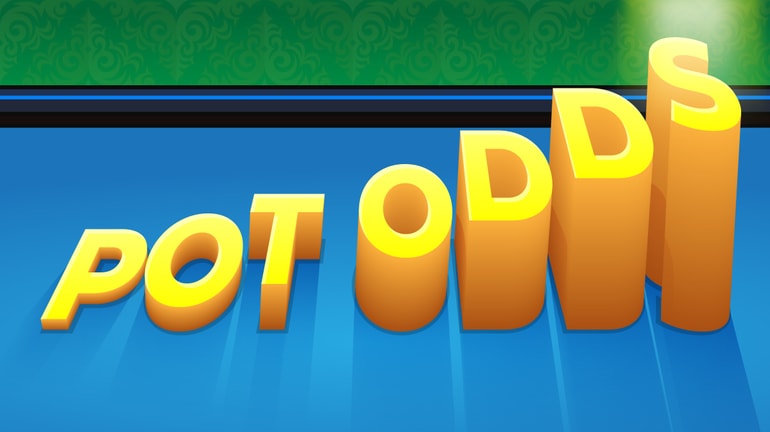Omaha Pot Odds
A typical feature in an Omaha Hi game is a set against a hand with several drawing possibilities. The made hand will not be a very big favorite (sometimes it is an underdog), so the recommended strategy is to play fast and bet/raise the pot in these situations. A typical feature in an Omaha Hi game is a set against a hand with several drawing possibilities. The made hand will not be a very big favorite (sometimes it is an underdog), so the recommended strategy is to play fast and bet/raise the pot in these situations.
I know that some people use the word “geek” in a negative way, but I assure you I’m using it positively in the title. Many people, including my family, consider me a math geek. In fact, I have a Bachelor of Science in Mathematics and have used my math skills in gambling for as long as I can remember.
Remember, your goal is to protect and give both opponents poor pot odds. You decide to raise so that Player 2 will only be getting 2:1 pot odds. This will give Player 1 even worse odds, since he has to pay $20 more to call than Player 2. If you were to raise to give Player 1 2:1 pot odds, Player 2 would be able to stay in the hand fairly cheaply. For Texas Hold’em players, the Pot-Limit Omaha variant feels close to home. Many of the same rules and format are shared across both game types, which form the opening 1-2 of HORSE and similar multi-variant games.
As someone who looks at gambling from a mathematical viewpoint, I’m always searching for opportunities to use math to win. This helps me avoid games I can’t beat, like roulette and slot machines, and helps me learn how to beat games like blackjack and poker.
Math usually teaches people that there is one right answer and everything else is wrong. It pushes a black and white view on everything in the world. This begs the question, “What’s the best game to gamble on from a mathematical standpoint?” And you might think that because I’m a math geek that I have to give you an answer.

While I do have an answer, I should also admit that it’s not the single right answer for everyone. If you read any of my articles you know that there are more ways than one to be a winning gambler. As long as you master at least one way to beat the casinos, you don’t need to worry too much about finding one best answer.
You can learn how to count cards and play blackjack with an edge. This is a straightforward way to beat the casinos, but it’s not the solution for everyone. As a card counter, you have to find good games and you’re always in danger of being confronted by casino personnel and banned from playing. Some gamblers aren’t willing to deal with this.
If you have strong mathematical skills, the best game to learn how to play is limit Omaha poker. Of all the poker variations, it’s the most mathematically-grounded game and the easiest to go from beginner to profit. It has the added benefit of being a game where your opponents tend to make more mistakes you can profit from.
In the following sections, I cover all of the reasons why Limit Omaha Poker is your best choice from a mathematical standpoint. I recommend limit instead of pot limit because it’s easier to reach the profit point at first with limit. Once you master Limit Omaha Poker, you can start exploring others, but stick with limit for now.
The fact is that you’re going to make some mistakes as you’re learning. Playing limit instead of pot limit keeps the cost of your mistakes lower as you’re learning.
The Rules
The first advantage you have in Omaha is the rules. Many Omaha players started with Texas holdem, and while the rules are similar, there are a couple of important things to understand. In Texas holdem, you can use any combination of your hole cards and the board cards to form a hand. In Omaha, you have to use two of your hole cards and three board cards.
This leads to some players making mistakes in Omaha. Any time one of your opponents makes a mistake, it’s profitable for you.
The first thing you need to do is learn everything you can about Omaha rules and make sure you never make a mistake because of the rules. With your mathematical mind, this is easier for you than most people.
Starting Hand Selection and Position
Most poker players don’t understand table position and how it directly changes the values of starting hands. Most players also play too many starting hands in Omaha. They think they can hit more hands on the flop because they have four hole cards.
Once you learn how position changes the value of your starting hands, and learn proper starting hand selection, it gives you a big advantage over most Omaha players. The best starting hands have four cards that work together in some way. Hands that only have two cards working together aren’t worth playing.
Some hands that have three cards working together are worth it, but many of them aren’t. As you learn about profitable starting hands, you’re going to find that playing fewer hands is almost always better than playing more.
It’s usually not the best idea to set a particular limit to starting hand selection because each game is different. You can play more hands in some games more profitably than others. But because this is aimed at math geeks, shoot for playing somewhere around 20% of your starting hands.
Once you reach this level, you can make small adjustments based on your competition. You also need to learn the correlation between table position and starting hand profitability. From early position, you must only play your best hands.
All four cards need to work together from early position. You can play more hands as you move around the table to late position. All of this is mathematical, and you can use this to your advantage every time you play.
Pot Odds
This section and the next section on expected value are where your mathematical ability is going to make you the most money. Everything you do at the Omaha table boils down to pot odds and expected value. And the best news is that once you master these two things, you’re going to have a huge advantage over most of the other players, because they don’t understand probabilities or don’t use them.
Pot odds is an area that requires an in-depth understanding, so I strongly suggest studying articles and books until you completely understand it. A good place to start is The Theory of Poker by David Sklansky. It also has a good explanation of expected value, and it’s responsible for as much of my profit in poker as any other book.
Expected Value
Omaha Odds Calculator - Card Player
Expected value is the long term expectation, either positive or negative, of any decision you make at the poker table. This includes your decision to enter the hand and every betting decision throughout the hand. In many cases, the expected value uses pot odds.
As a beginner, you have to make your best guess about some things when determining expected value. The truth is that even experienced players have to make a best guess at times, but you refine your skills and get better with experience.

Expected value is the biggest reason why Omaha is the perfect game for math geeks. It takes all of your math skills and translates them into profits. Take advantage of your skills and master expected value. It’s the key to profits, both long term, and short term.
Bankroll Size
You don’t have to be a math geek to determine proper bankroll size for Omaha, but if you need help to learn how to manage your casino bankroll take a look at our guide. Your math skills do come in handy as you learn how to win on a consistent basis. In Texas holdem, even the best players have up and down swings that require a large bankroll.
Omaha is based on math more than Texas holdem, so once you master your skills, you’re going to find that you don’t need as large of a bankroll. The common suggestion for Limit Texas holdem is 300 times the big blind.
I suggest starting with this in Limit Omaha Poker as well, but once you use your math skills to master Omaha, you can usually get away with as low as 100 times the big blind. You’re still going to have down swings based on short term variance, but the swings are less severe than in Texas holdem because the math is more important in Omaha if you know how to use it.
Conclusion
Omaha Pot Odds Calculator
Limit Omaha Poker is the best game to master if you have strong math skills. Every decision you make while playing has a correct or best way to play based on math. Most players never learn how to use math to make a profit, but you can use your skills to quickly gain an advantage.
Cached
Once you learn how to consistently win at the limit tables, consider moving to the pot limit tables. The same skills you use to beat the limit game are used in pot limit, and the long term profits can be higher. But the short term variance is also higher, so you need a larger bankroll once you move to pot limit play.